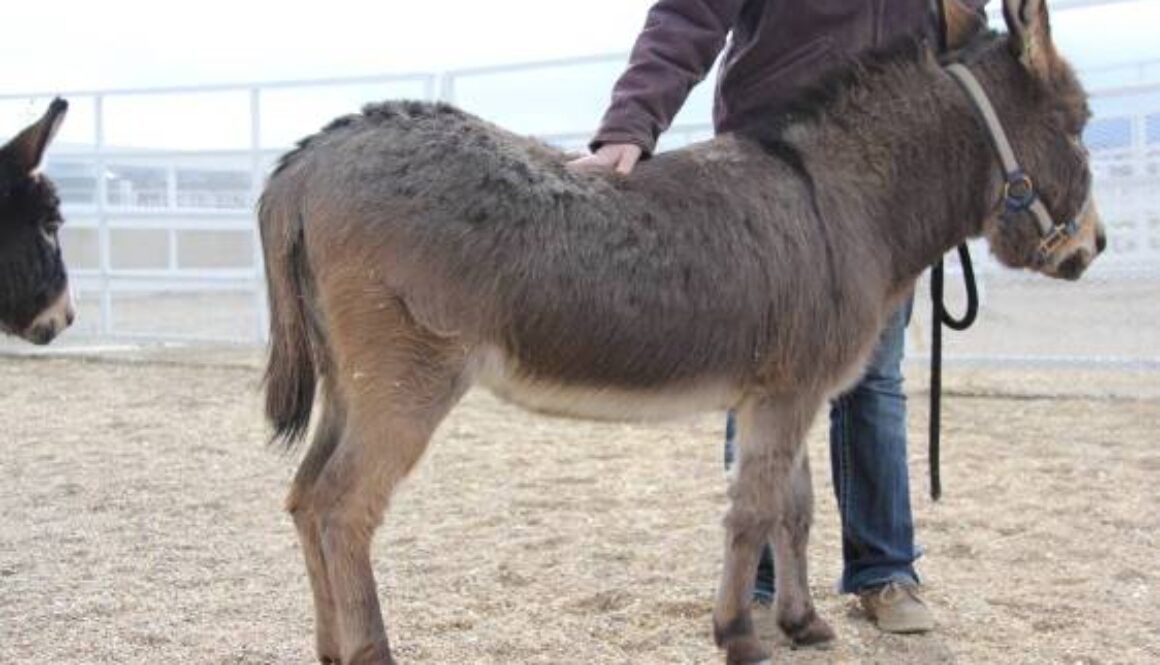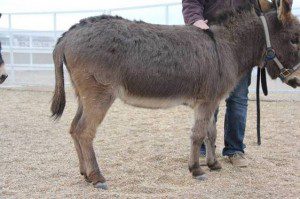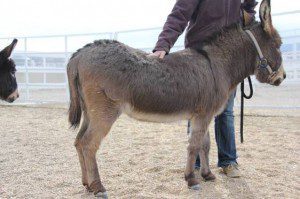MULE CROSSING: Donkeys: The “Sinking” Reflex
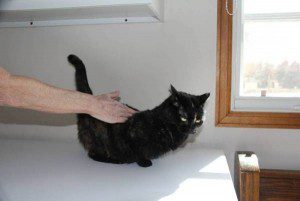 Donkeys have a lot of behaviors that owners might find strange. One of these is dropping their spine, or “sinking,” when you put a hand on their back. Not all donkeys will do this, but many of them will, especially when they are young and or haven’t been handled routinely. I’ve personally had experience with donkeys sinking to the point that they’ll go down to the floor on their knees and bellies. You may also commonly recognize this behavior in cats and dogs.
Donkeys have a lot of behaviors that owners might find strange. One of these is dropping their spine, or “sinking,” when you put a hand on their back. Not all donkeys will do this, but many of them will, especially when they are young and or haven’t been handled routinely. I’ve personally had experience with donkeys sinking to the point that they’ll go down to the floor on their knees and bellies. You may also commonly recognize this behavior in cats and dogs.
In order to understand what’s happening, it is important to understand the intervertebral equine anatomy. “Intervertebral” refers to the opening between two jointed vertebrae for the passage of nerves to and from the spinal cord. When a foal is first born, their bones and cartilage are soft and flexible, and their nerves in these areas are hypersensitive —especially over the spine.
A foal that has not had the benefit of imprinting will be much more sensitive and generally reactive to touch than one that has been imprinted. Imprinting begins to desensitize nerve endings throughout the body wherever the animal is touched. However, the primary focus when imprinting is usually on the head, neck, ears, around the eyes, mouth, and down the legs, with only a passing swoop over the back and croup. Thus, the back does not get as much desensitization during imprinting and is largely ignored until grooming comes into the picture, and later, tack and equipment.
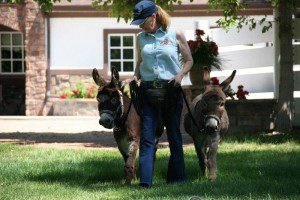 As the foal ages, muscles begin to develop under and around the nerves thanks to ongoing exercise. When muscles get harder and toned, though still maintaining their elasticity, they put pressure on the nerves from the inside of the body. You will start to notice that the foal that used to “jump” out from under your touch is now increasingly tolerant, and his reactions are not as abrupt and overdone. Foals that are more active in their exercise tend to be less likely to sink their backs, as their hardened muscles have begun to desensitize the nerves to some extent. Softer, untoned muscles do not affect nerves in the same way, so less active foals will usually have a more drastic reaction to touch.
As the foal ages, muscles begin to develop under and around the nerves thanks to ongoing exercise. When muscles get harder and toned, though still maintaining their elasticity, they put pressure on the nerves from the inside of the body. You will start to notice that the foal that used to “jump” out from under your touch is now increasingly tolerant, and his reactions are not as abrupt and overdone. Foals that are more active in their exercise tend to be less likely to sink their backs, as their hardened muscles have begun to desensitize the nerves to some extent. Softer, untoned muscles do not affect nerves in the same way, so less active foals will usually have a more drastic reaction to touch.
With the right kinds of controlled passive leading exercises, the foal’s body can grow properly, conditioning muscles symmetrically and allowing the body to develop balanced equine posture. This conditioning allows for efficient movement, maximum blood circulation, internal organs working as intended, joints bending correctly, and nerve impulses firing in an unobstructed and healthy manner. When the animal is not exercised with good postural balance in mind, his way of going can be compromised. Though his unbalanced movement may not be apparent to the untrained eye, it can still produce pinched nerves and pain. If you have an animal that sinks to your touch, it is up to you to determine whether the reaction is a case of sensitivity due to minimal touch, or a more serious case of pinched nerves.
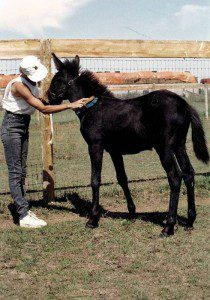 You can help desensitize your equine in a healthy way by continuing to imprint throughout the training process. Don’t just limit imprinting to a birth exercise, but pay attention to every phase and opportunity for touch. When grooming with the shedding blade for instance, pay special attention to the pressure over different places on your equine’s body. You can apply more pressure to fatty areas, but be sure to lighten up over the bony areas, as it can cause pain. Too much pressure over the spinal nerves will produce the sinking effect. When using your brushes over the body, be sure to use short flicks instead of long strokes. Short flicks induce more passive pressure over the nerves, which not only removes dirt more efficiently, but also provides more endurable pressure over the nerves that will eventually minimize your equine’s sensitivity. With these careful and detailed practices, the sinking effect will soon disappear.
You can help desensitize your equine in a healthy way by continuing to imprint throughout the training process. Don’t just limit imprinting to a birth exercise, but pay attention to every phase and opportunity for touch. When grooming with the shedding blade for instance, pay special attention to the pressure over different places on your equine’s body. You can apply more pressure to fatty areas, but be sure to lighten up over the bony areas, as it can cause pain. Too much pressure over the spinal nerves will produce the sinking effect. When using your brushes over the body, be sure to use short flicks instead of long strokes. Short flicks induce more passive pressure over the nerves, which not only removes dirt more efficiently, but also provides more endurable pressure over the nerves that will eventually minimize your equine’s sensitivity. With these careful and detailed practices, the sinking effect will soon disappear.
These kinds of initial training practices will greatly enhance the training experience for both you and your equine. All behaviors, bad or good, arise from the way you do things with your animal, and you will only gain his trust when you make him feel good. When he feels good, his behavior will be good. Preparing him properly before asking him to carry tack and equipment, and later, a rider, will make the process much easier for him to accept, and will avoid the adverse behaviors and even painful or severe consequences that can develop without proper preparation. Be patient and always take the extra time to do the little things that will enhance your time together. It will be well worth the effort!
To learn more about Meredith Hodges and her comprehensive all-breed equine training program, visit LuckyThreeRanch.com or call 1-800-816-7566. Check out her children’s website at JasperTheMule.com. Also, find Meredith on Facebook, YouTube and Twitter.
© 2016, 2020, 2022 Lucky Three Ranch, Inc. All Rights Reserved.

